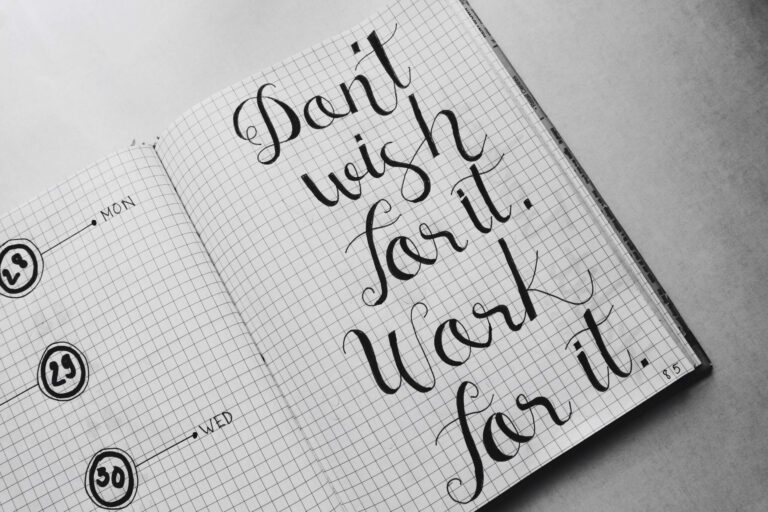We all know that establishing new habits is often easier said than done. But have you ever heard of habit trackers? These practical little tools can make all the difference when you are trying to get your routines on track and master them in the end. This article is jam-packed with amazing habit tracker ideas that help you reach your goals and lead a better life.

Explore our
Shop
and discover digital products that support you on your journey to your next-level self.
What Is a Habit Tracker?
A habit tracker is a surprisingly simple but effective tool for cultivating new habits and overcoming old ones. It enables you to visualize and track your progress toward specific goals. This helps to keep you motivated, and it becomes easier to stay consistent.
How a Habit Tracker Helps You to Lead a Better Life
At first glance, a habit tracker may seem like a simple diagram or to-do list. But the real magic is in the psychology behind it. You increase awareness of your actions and decisions by recording your habits daily. You see precisely where you’re being successful and where you still have room to improve. This can help you establish the desired habits and to let go of unwanted ones.
Why It’s Important to Track Your Habits
You may be asking why it is so important to track our habits. The answer lies in the power of habits and their impact on our lives. Habits can make a significant difference in whether we achieve our long-term goals or not. They can even help us transform our entire lives.
Understanding and Controlling Your Habits
A habit tracker helps you understand your habits better. It shows you when you’re sticking to them and when you find it difficult to follow through on them. This valuable information gives you control over your habits and helps you shape them to match your lifestyle.
Establishing Useful Habits
With the help of a habit tracker, you cannot only recognize and change negative habits, but you can also establish new, positive ones. With it, you can track a fitness goal, learn a new skill, or organize your daily life. It’s a tool that inspires you to be your best self.
Continual Improvement
Your habit tracker is a constant companion on your path of self-development. It provides you with the feedback you need for constant improvement. Whether you meditate daily, reach your learning goals, or stick to your meal plan, your habit tracker supports and guides you to success.
Visualizations of Progress
Lastly, a habit tracker motivates you by showing you your progress at a glance. Filling in your tracker and visualizing your progress can be very satisfying and give you tangible confirmation of your dedication and hard work.
Therefore, it’s no surprise that habit trackers have become so popular in the area of self-development. They’re a powerful tool for using our habits to our advantage and leading a designed life that we love. So, why not start today?
29 Habit Tracker Ideas
Now that you know what a habit tracker is and how it can function, let’s review a few specific examples of how you can use it in various areas of your life. Be creative, and remember that these habit tracker ideas are just a starting point – your habit tracker can and should be tailored to your individual needs and goals.
Habit Tracker Ideas for Health and Fitness
- Workouts: Track the type of training, your exercise units, and the duration of your workouts.
- Healthy Nutrition: Track whether you’re eating your daily servings of fruits and vegetables.
- Drinking Water: Track your daily water intake to ensure that you are sufficiently hydrated.
- Medications and Supplements: Record whether you’ve taken your medication or supplements.
- Taking Cold Showers: Track if you took an invigorating cold shower.
- Alcohol: Keep a record of how many days you didn’t drink alcohol.
- Eating Enough Protein: Track if you’re taking in enough protein.
- 10,000 Steps Per Day: Record whether you’re getting enough exercise and have walked 10,000 steps in the day.
- Stretching: Track if you’ve stretched.
Habit Tracker Ideas To Stay Neat and Organized
- Daily Tidying Up: Track whether you’re doing daily tidy-up tasks, such as making the bed, washing dishes, and doing laundry.
- Weekly Planning: Track whether you plan out your tasks and appointments for the week every week to stay organized.
- Taking Out the Trash: Track if you dispose of the trash daily.
- Evening Tidy Up: Record whether you tidy up in the evening so you can start the next day relaxed.
- Tidying Up Your Desk: Keep track if you tidy your desk after work or learning.
Habit Tracker Ideas For Work and Productivity
- Work Hours: Track your work hours each day to ensure that you don’t overwork.
- Professional Development: Track the time you’re spending on your professional development in your field.
- Taking Breaks: Track if you’re taking breaks during your work to avoid burnout.
- Responding To Emails: Track if you’ve answered or archived all of your emails.
- Breathing exercises: Keep track of whether you took any time for breathing exercises to relax.
- Planning Your Day: Keep track of whether you planned your day the night before or in the morning.
- Prioritizing Your To-Do List: Track if you’ve made your To-Do List and prioritized it.
- Recording Achievements: Track if you have written down and celebrated your accomplishments at the end of the day.
Habit Tracker Ideas for Self-Care
- Skincare Routine: Track whether you’re doing your skincare in the morning and the evening.
- Meditating: Track your daily or weekly meditations.
- Enough Sleep: Track whether you’ve slept at least 7 or 8 hours.
- Starting the Day Without Your Cellphone: Track if you do a 30-minute digital detox every morning.
- Keeping a Gratitude Journal: Track if you fill out your gratitude journal in the morning or the evening.
- Journaling: Track if you’re regularly writing in your journal to get to know yourself better.
- Saying Positive Affirmations: Track whether you’ve said positive affirmations once or multiple times throughout the day.
- Reading: Track whether you’ve read at least 10 pages every day.
Use these habit tracker ideas to create a system that helps you understand your habits better and supports you on the path to reaching your goals.
Your list of habits can look completely different depending on your goals and plans. The only important thing is that you select habits that will bring you closer to your goals.
Tips for Using Your Habit Tracker
There’s no right or wrong way to use a habit tracker. But here are a few tips that can help you get the most out of your tracker:
- Keep It Simple: Your habit tracker isn’t meant to overwhelm you. Choose just a few habits that you truly want to improve or establish.
- Be Consistent: The most important aspect of using a habit tracker is consistency. Try tracking your habits daily to stay on top of things.
- Assess Your Progress: It’s important to regularly assess your progress and make changes where needed.
Remember: a habit tracker is a tool for self-improvement and not an instrument of self-criticism. It isn’t about being perfect; rather, it’s about being better than yesterday.
What’s the Best Way to Track Habits: Digitally or On Paper?
You may wonder if managing your habit tracker digitally or on paper is better. The answer lies with you and your individual preferences. Indeed, both methods have their pros and cons, and we’ll take a closer look at the most important features here:
Digital Habit Tracker
For those of you who are tech-savvy, a digital habit tracker is a superb option. You can use various apps and online platforms to design and set up your habit tracker as you would like. The advantages of a digital habit tracker are:
- Easy Access: Whether on your cell phone or your laptop, a digital habit tracker is always only one click away.
- Automated Reminders: Many modern apps offer notifications to remind you of your habits.
- Integrated Analyses: You can easily create progress reports and trend analyses to get a better overview of your habits.
Habit Tracker on Paper
If you love the physical feel of things and the satisfaction of crossing off a completed task, then a paper-based habit tracker might be the right thing for you. The benefits of habit trackers on paper include:
- Personalization: You can design your habit tracker exactly as you imagine it. Whether you like drawing or prefer a simple list, you can let your creativity run wild.
- No Technical Distractions: Without notifications and apps that could be a distraction, a paper-based habit tracker can help you direct your focus on your habits.
- Nostalgic Charm: There’s something nice and satisfying about writing things down by hand and crossing them off.
Choosing between a digital and a paper-based habit tracker is a personal decision. Consider which method best matches your lifestyle and most likely helps you to stay engaged. Regardless of your choice, remember that the most important thing is that you’re regularly tracking your habits and constantly working toward improvements.
From Failure to Success: Tips to Overcome Setbacks
We are all human, not machines. It can happen that you miss a day in your habit tracker. Don’t panic! It’s important to understand that failing at a habit is not a permanent failure; it’s just an opportunity to learn something new.
Analyze the Situation
When you’ve missed one or more days in your habit tracker, it’s important to understand why. Were you too busy? Was the task too difficult? Do you feel overwhelmed by the amount of tasks? Once you have determined the cause, you can better tackle this obstacle in the future.
Don’t Be Too Hard on Yourself
It’s easy to fall into a cycle of self-criticism and frustration when you feel you have failed. However, errors and setbacks are part of life and the learning process. Don’t be too hard on yourself. It’s completely fine not to be perfect. Remember that consistency is more important than perfect execution.
Set Realistic Goals
Sometimes, our goals are too ambitious and too much to handle. In these cases, perhaps you should reassess your expectations for yourself and your goal. Be sure that your goals are realistic and attainable. Lower the standards and raise them gradually when you feel ready.
Revise Your Plan
If needed, you should revise your habit tracker. Your goal should be to have a habit tracker that helps you reach your goals and not one that overwhelms or stresses you. Perhaps you only need to reduce the number of habits you’re tracking.
In the end, habit trackers aren’t about having a perfect track record – they’re about getting to know yourself better and improving continuously. Therefore, don’t worry when you miss a day. What’s important is that you don’t give up and will continue. Take this opportunity to learn from your errors and to improve your habits accordingly.
Conclusion
A habit tracker can be a life-changing tool that helps establish new, healthier habits and let go of old, less conducive ones. It’s easy to use and can be adapted to track a wide variety of goals and habits. Don’t be afraid to be creative and try various habit tracker ideas!
FAQs
A habit tracker is a tool that helps you establish new habits. You can record in a chart whether you carried out the routines you have targeted for yourself (such as exercising, cleaning, eating healthily, etc.) every day. This enables you to make progress visible and to celebrate your successes.
In essence, it’s very simple. You note down the habits you would like to establish and make a checkmark (or a stroke, or whatever you like best) if you’ve carried out the habit on that day. You should fill out your habit tracker every day so it can unfold its full effectiveness.
Absolutely! Many apps help you manage a digital habit tracker. Many people prefer digital trackers since they’re always on hand and easy to update.
Don’t worry—it happens to us all! What’s important is that you don’t immediately give up but see your habit tracker as a tool, not an obligation. Give yourself permission to “miss” a day from time to time, and don’t punish yourself for it. What’s important is consistency, not perfection!
This is very individual and varies widely from person to person and from habit to habit. According to studies, it can take about 66 days on average for a new habit to become firmly established. But don’t let this discourage you. The key to success is consistency. Every day that you practice a new habit, you take one step closer to your goal.
The great thing about habit trackers is that they’re flexible and can be adapted to individual needs. If you’re just starting out, too many habits all at once can be overwhelming. Begin with one or two small changes and then add further ones over time. Don’t overdo it: the goal is to bring about lasting changes, not to overwhelm yourself.
Yes, definitely! By tracking your bad habits, you can know how often and when they are happening. This process of self-awareness can help you find ways to change or eliminate those habits. You’ll also see your progress at a glance if those unhealthy habits slowly vanish.
is your online hub for everything you need on your journey to your best self – inside and out. Discover articles, tips, and resources on personal growth, self-care, productivity, and mindset. For your mindful growth and your next-level self.






